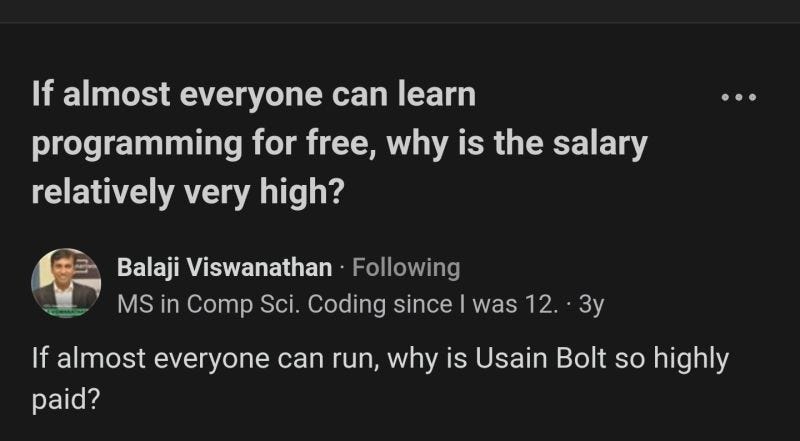More Creators + Taro's Success
Hey everyone 👋🏽 Today we’ll cover:
Introducing Lee McKeeman as a Taro creator
Successful onboarding as an engineer
How does Taro succeed?
New Taro creator: Lee McKeeman
Lee McKeeman is the newest creator on Taro. On LinkedIn he describes himself: “Staff Software Engineer at Google * Good Person to Know * Autistic” – he’s worked at several startups, along with a bunch of Big Tech cos (Amazon, Meta, and Google)
We’ve been blown away by the detail + care he puts into so many questions. Some examples:
“How to run meetings effectively?” from a Senior Eng at Twitter: https://www.jointaro.com/question/CModSkZ4LWzw9bdaiakt/what-are-some-thoughts-on-maintaining-good-meeting-hygiene
“How do I know what I’m good at?” from an Entry-Level Eng at a Series D company: https://www.jointaro.com/question/hksE5OSxktWdbnQQFdaT/how-do-i-know-what-im-great-at
“How to balance between specialization and pigeonholing?” from a Senior Eng at Zendesk: https://www.jointaro.com/question/HL8uNNhwyPLBGv6RWaTX/how-to-balance-between-specialization-and-pigeonholing
With Taro, you can ask a question and get a high quality response from someone like Lee, Alex, Rachel, or other Taro Premium members here: https://www.jointaro.com/questions/create.
Successful onboarding as an engineer
We have a Taro Premium session coming up next week, but our next free live session is on Saturday, October 29 at 10am PT about onboarding. Find the details on the LinkedIn event.
As a primer to that event, here’s a great question about onboarding from a Senior SWE at Grab: https://www.jointaro.com/question/RiYijujiMNSZ9YhBo1Jd/what-is-the-most-effective-way-to-onboard-yourself-to-a-new-teams-domain
The core parts of Alex’s and Rachel’s answer:
Get clarity of what's important moving forward and learn by solving a problem.
Build a “learning agenda” and carve out time for deliberate learning
Have clarity with your manager about the expectations for your onboarding (there should be a written artifact)
How Does Taro Succeed?
Lee is a prime example of what makes Taro work: we offer the highest quality discussions of software engineering career growth on the Internet. The question becomes, “How do we get more people like Lee to participate in Taro?”
When building a company, the expression “only the paranoid survive” is so true. You have to anticipate problems and mitigate them to continue growing.
This manifests in 2 ways:
As we’ve grown over the past few months, we need more high quality creators on Taro. If we don’t solve this incentive problem, we won’t be able to help 100s of thousands of engineers.
We need sustainable growth channels. Today, a bad week on my YouTube channel translates to a bad week on Taro, which is an uncomfortable place to be. I’ve seen channels with 100K+ subscribers that are effectively dead because they got off the content treadmill. Attracting other creators and doing better with things like SEO will help diversify where traffic is coming from.
If you have ideas here, I’d love to hear from you! What are ways we could make it compelling for you to share your wisdom on Taro?
p.s. if you’re interested in logistics around things like founder salaries, check out my most recent video.
The image below perfectly captures the need for Taro. Just like any other profession, the gap between a competent programmer and a great software engineer is enormous.
Taro is designed to show you what great looks like, and then help you get there. We’d love to have you join us.




I rarely comment on Substack of all places, but I seriously recommend following Lee on LinkedIn if you aren't already: https://www.linkedin.com/in/lmckeeman/
Lee is one of the kindest people in tech with a massive amount of wisdom behind him, and it shows in the empathetic, thorough, and ultra high-quality advice he shares.